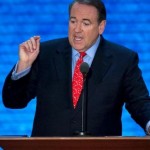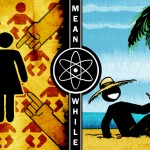Each Friday in Not Fit for Dinner, C. Ryan Knight explores political issues and the preconceptions guiding our understanding of and responses to them.
I want to follow up my column Placing #ObamaInHistory last week by addressing the issue of President Barack Obama’s alleged arrogance. Many saw the changes to White House presidential biographies as more proof that Obama is arrogant. Reflecting on Obama’s modification of White House president biographies, Heritage Foundation writer Rory Cooper (who brought the modifications to the national spotlight) asserted that recently “we have witnessed several displays of arrogant power emanating from our White House . . .”
Earlier this year, Cooper’s colleague Lachlan Markay warned Obama is paving a “road toward an arrogant, new authoritarianism.” Markay does not name Hitler, Stalin or Mussolini, but he nonetheless conjures their ghosts as though they are invisible members of Obama’s cabinet who coach him on how to follow in their bloody footsteps.
Obama has not been criticized for arrogance by Republicans only. Rep. Dennis Cardoza (D-Calif) wrote a blog entry last December in which he agreed Obama is arrogant (though he does not sound the totalitarian alarm as does the Heritage Foundation). Cardoza cites three general actions that indicate Obama is arrogant : “idea disease,” thinking he’s always right, and lecturing others rather than listening. He concludes with saying Obama must adjust these off-putting behaviors if he wishes to be reelected come November.
Cooper, Markay, and Cardoza are in no position to say whether or not Obama is arrogant as a person—nor am I. Discussions of Obama’s alleged arrogance must be restricted to the political arena and should veer from his private life. If someone really wants to judge whether or not Obama is arrogant as a person, Obama’s books are, I think, the best place to turn. I see little fruit coming from such judgments, though.
When discussing arrogance, it is important to identify arrogance’s “companion” characteristic: boldness. The two overlap in many ways, and someone could easily mistake a person’s boldness for arrogance—and likewise arrogance for boldness. (The two aren’t necessarily exclusive either. Someone could be simultaneously bold and arrogant—or neither.)
Christians may turn to Scripture for illustration of this overlap of boldness and arrogance. Daniel risks being mistaken for arrogant when he chooses to reject King Nebuchadnezzar’s choice food (Daniel 1). It is God’s blessing that tips the scales in favor of boldness rather than arrogance in the eyes of the commander of Nebuchadnezzar’s officials. Had Daniel’s boldness been seen as arrogance, things almost certainly would have turned out much worse for him than they actually did.
To evaluate whether Obama is arrogant as a president, it is important to place him within the current political situation. When he took office, he faced enormous issues: the growing Great Financial Crisis and increasing unemployment; the War on Terror; the need to reform health care and social security; and more. Here is also not the place to say what should be done about all these things. It’s important simply to bring up the array of pressing issues needing to be handled promptly—and boldly.
President Franklin D. Roosevelt, who took office in similar yet more intense conditions, also had to act boldly to address America’s woes. Biographer Max Hastings noted that many people thought Roosevelt was “an arrogant, privileged dilettante.” Regardless of whether or not Roosevelt was arrogant, he made every effort to deliver bold responses to the depression. Roosevelt once said, “at night when I lay my head on my pillow, and it is often pretty late, and I think of the things that have come before me during the day and the decisions that I have made, I say to myself – well, I have done the best I could and turn over and go to sleep.”
When dealing with presidential action and policies, it is very difficult to gauge someone like Obama’s perceived arrogance. Usually, the side of the fence you say he falls in depends largely upon your political and ideological beliefs. (It is thus no surprise that Heritage Foundations evoke totalitarian ghosts when they write about Obama.) Discussions like this require you to make judgment upon another, and it’s well to recall Christ’s warning against judging others (Matthew 7.1-6).











